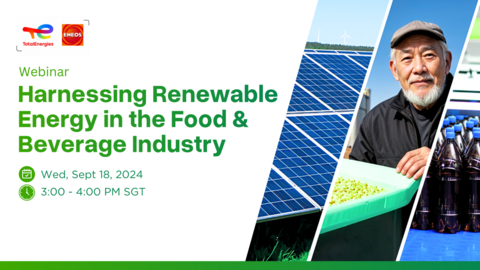

Partners
Harnessing Renewable Energy in the Food & Beverage Industry

This webinar aims to provide practical information and concrete solutions for companies in the Food & Beverage and Fast-Moving Consumer goods sector looking to reduce their carbon footprint and promote the adoption of renewable energy in the Asia-Pacific region. The event will feature experts in solar energy, case studies, examples of successful projects in the region, and interactive discussions with industry professionals.
The food and beverage (F&B) industry is focusing on sustainability to meet changing demands and regulations. The production of food and beverages across the entire supply chain consumes lot of energy and generates significant emissions. Switching to renewable energy helps reduce costs and minimize environmental impact.
The need to adopt renewable energy in the F&B industry has never been more critical.
Dive into this webinar to:
• Learn how green electricity supports cuts of the F&B industry emissions
• Uncover the lasting benefits of sustainable energy for your business
• Explore TotalEnergies' expertise across the energy value chain.
TotalEnergies is a major global integrated energy company, that produces and markets energies. In 2022, TotalEnergies established a 50/50 joint venture with ENEOS Corporation, a Japanese leading energy major, aiming to jointly develop 2 GW of solar distributed generation in the region over the next 5 years. Today, we are present in 11 countries in APAC with our HQ in Singapore, with over 300 MW in operation and under construction.
TotalEnergies Renewables DG’s fully integrated no-CAPEX solutions are designed to help customers reduce their energy bill and lower their carbon footprint. Its business model is designed to offer specialized, competitive solutions to B2B customers through long-term Power Purchase Agreement (PPA). To meet their needs, TotalEnergies Renewables DG provides a range of tailor-made photovoltaic (PV) solar systems that can be installed on rooftops, car-port structures, water spaces or vacant land. Once installed, customers pay only for the power generated, resulting in immediate energy bill savings supporting their sustainability efforts.
Harnessing Renewable Energy in the Food & Beverage Industry
Event ended.

